The Perfect Book for Every Bad Mood and Upsetting Dilemma
We all have our trying times (or years). Here's the cure for what ails you. Read—and be restored.
By Liesl Schillinger

For when you've been cheated on
In an insightful new novel from France, Couple Mechanics, by Nelly Alard, a strong and lovely working mother, nearly 40, discovers her husband is cheating on her, when he tells her. Instantly, she recognizes that he is paralyzed by the affair: It could sink him and their marriage, or not. It's up to her to save or scrap the relationship. Does she want to stomp out, feeling wronged, or stay and win—by reinventing the relationship on terms she can tolerate? This novel is bracingly pragmatic in its perception that an affair involves at least three people, not just two. The betrayed party has power, and in this novel, wields it, impressively adding to the reputation of French women for savoir faire.

For when you don't like the person your sibling or close friend has married
In The Past, a beautifully perceptive novel by the British writer Tessa Hadley, three middle-aged sisters and their brother have a final reunion at the country house they're about to sell. Their brother dismays them by bringing his new wife, Pilar. Hadley writes, "They were all affected by Pilar's new presence among them—it had the effect of making their talk at the table seem false, as if they were performing their family life for her scrutiny." But as Pilar and one sister fight to hold on to the family house, Hadley shows the surprising ways that siblings can be stranger than newcomers.

For when you dress completely wrong
Few writers have a keener memory of everyday humiliations than the Norwegian novelist Karl Ove Knausgaard. In Boyhood Island—volume three of his magisterial novelized memoir My Struggle—he recalls a childhood swim-class fiasco, when he shows up with a ladies swim cap. "I can't wear a cap with flowers on it!" he tells his mother. "You'll have to go and change it." "Karl Ove, my love, the shops are closed. I can't," she says. Tears streaming down his cheeks, he goes to the class. The other boys do tease him; but it's an incident everybody but he quickly forgets. Reading of his misery at this minor mishap, we realize that our own wardrobe misfires and social gaffes don't matter nearly as much as we think they do.

For when people tell you that you're lucky, but you feel unhappy
Few things make you feel worse about being miserable than being told you should feel fortunate for circumstances that upset you. Charlotte Brontë's orphaned heroine in Jane Eyre was scolded for not appreciating the security her rich but cruel relatives gave her. She thinks, "I could not answer the ceaseless inward question—why I thus suffered; now, at the distance of—I will not say how many years, I see it clearly." Brontë writes, "Children, can feel, but they cannot analyse their feelings." Just because we, as adults, can analyze our feelings doesn't mean we do. Don't let others—even if they mean well—treat you like an ungrateful child. Jane Eyre reminds you that you have the right, and the power, to assess your own world.

For when you are afraid to get married
More than 150 years ago, Anthony Trollope devoted his long, ravishing, astute and very fun novel, Can You Forgive Her? to the struggles of the waffling Alice Vavasor, who can't decide if she wants to get married. Her fiancé is thoroughly decent and Alice loves him. But does that mean she has to marry him? She isn't sure. Trollope writes, nonjudgmentally, that she had "filled herself with a vague idea that there was a something to be done; a something over and beyond, or perhaps altogether beside that marrying and having two children;—if she only knew what it was." If you yourself feel undecided, you can find all of your anxieties reassuringly addressed in this book; even, if ultimately, you must resolve them yourself.

For when you are insecure because you think your best friend is better than you
The competitive dynamic between two friends in Naples runs like a lit fuse through Elena Ferrante's four Neapolitan novels. When Elena Greco (called Lenu) and Raffaella Cerullo (called Lila) meet as girls, in My Brilliant Friend, Lenu is awed by her friend's intelligence, charisma and originality. Yet it is Lenu, not Lila, who will become a famous writer: Lila's precocious gifts inspired Lenu; but it was Lenu, not Lila, who had the tenacity to use her own gifts. Ferrante's novel shows that it is the friends we love—and yes, envy—who possess the transformative power of making us grow.

For when you're so tired you can only read short sentences
If you're so exhausted after your long, hard day that you can't even summon the energy to order pizza, what book do you pick up to spoil yourself a little, as you pour yourself a bowl of cereal? Why, The Taliban Shuffle, of course—Kim Barker's hilarious memoir of her benighted rovings through Afghanistan and Pakistan, where she landed in 2003 as a war correspondent for the Chicago Tribune, and stayed seven years. The war zone she describes feels like Never-Never Land. In Afghanistan, slim, young soldiers wear eyeliner, tuck yellow flowers behind their ears and adore "anything fluorescent or sparkly;" in Pakistan, men in crowds always pinch her bottom—even at Benazir Bhutto's funeral. Meanwhile, regional women pity her for being single, and fuss over her terrible hair. The movie made from the book, Whiskey Tango Foxtrot, emphasizes the dangers of Barker's work; but the book is straight-up funny—the self-deprecating story of a woman who finds dating more daunting than covering a war.

For when you're up late at night consumed with regret for all the bad decisions you've made
You may have shown bad judgment on occasion, but...have you ever held up a liquor store? To give yourself perspective on your woes, escape into Elmore Leonard's entertaining novel, Swag, and steep yourself in the escapades of Leonard's unlucky but optimistic hold-up artists, Frank and Ernest (aka Stick). Frank and Stick meet in Detroit in the 1970's, when Stick steals a used car from the dealership where Frank works. After Frank decides to let him get away with it, the two men embark on a small-time crime spree, using their stolen loot to host pool parties with ladies in their apartment complex. They have an absolutely wonderful time, until they get caught. Feeling affection for these misguided men, you'll come to see that your own (noncriminal) slip-ups are not so terrible; they're just a natural part of the human comedy.

For when you're hiding out on Saturday night, skipping the party
If you feel guilty for opting out of the social whirl, find reinforcement in the precocious wisdom of the pre-teen protagonist of Muriel Barbery's, The Elegance of the Hedgehog, Paloma, who anticipates how grim forced gaiety can be. "If you imagine that getting high at a party and sleeping around is going to propel you into a state of full adulthood, that's like thinking that dressing up as an Indian is going to make you an Indian," Paloma reflects. "It's a really weird way of looking at life to want to become an adult by imitating everything that is most catastrophic about adulthood." Not every party is catastrophic, of course, but Barbery's thoughtful novel reminds you of the pleasures of staying in and enjoying your own company, when the mood strikes.

For when you need to cry it out
A very good way to shake yourself out of a blue mood is to immerse yourself in the blues of others. The ocean of emotions in Jojo Moyes' novel, Me Before You about a young woman who falls in love with the handsome, rich, angry young man she cares for—who has been paralyzed in a motorcycle accident—will buffet you with waves of cleansing, renewing tears. It's all right to be sad, the novel shows you: Strong emotions let us feel our common humanity.

For when you're in a fury
Revenge is the cure for fury; and the most multifaceted, awesome revenge novel ever written is Alexandre Dumas's The Count of Monte Cristo. If you don't know the story, take it up, and learn in it how a successful and promising young man, Edmund Dantès (later the "Count" of the title) avenged himself on the wicked connivers who sent him off to life imprisonment in the Château d'If. (One of them had wanted to marry Dantès's fiancée). After escaping, and finding treasure, Dantès conceives an elaborate plan to punish his betrayers. His slow and steady achievement of retribution will satisfy you deeply. Justice can be served, Dantès shows, if you "wait and hope"...and plot.

For when you, or those close to you, have gender-identity issues
In the 1970s, the novelist John Irving anticipated today's Caitlyn Jenner-led apotheosis of gender-identity awareness with The World According to Garp (1978), in which the football player Robert Muldoon becomes Roberta through surgery. Roberta tells Garp, "I always knew I should have been a girl." Her friends had tried to persuade her not to change her sex, she explains, but she fiercely defended her decision. Irving presciently understood that a person's sexual self-definition resides not in the mirror, but in the mind.

For when you want to be kidnapped from the next three hours of your life
The Devil in the Flesh is one of the most potent, provocative, romantic reading experiences you could ever give yourself. It's a slim, largely autobiographical novel about a love affair between a 16-year-old boy (unnamed) and an 18-year-old married woman, Martha, who fall deeply in love and have an intense sexual affair while her husband is away at war. This is not YA: The narrator is not childish, and although he loves with intensity, he brings fascinating detachment to his scrutiny of his feelings. "It was only now when I was certain that I no longer loved her that I began to love her," he writes. The author, Raymond Radiguet, was only in his teens when he wrote this book; he died at 20 of typhoid. But this novel gives him eternal life in the pantheon of great writers, and will immerse you in his sensual, nuanced mindset.
 Liesl Shillinger is the author of Wordbirds: An Irreverent Lexicon for the 21stCentury. Find her at LieslSchillinger.com.
Liesl Shillinger is the author of Wordbirds: An Irreverent Lexicon for the 21stCentury. Find her at LieslSchillinger.com.
 Liesl Shillinger is the author of Wordbirds: An Irreverent Lexicon for the 21stCentury. Find her at LieslSchillinger.com.
Liesl Shillinger is the author of Wordbirds: An Irreverent Lexicon for the 21stCentury. Find her at LieslSchillinger.com.Published 04/25/2016

